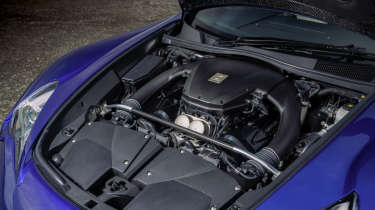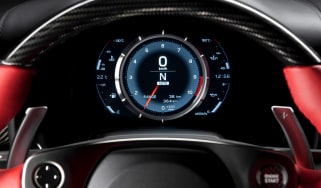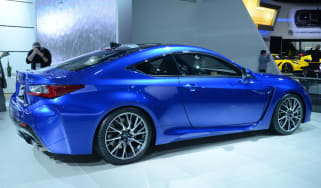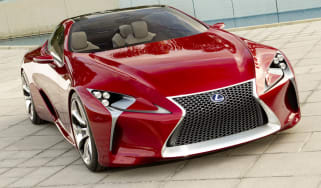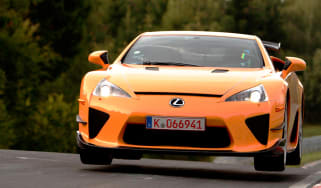Lexus LFA (2009 - 2012) review – the ultimate Japanese supercar
The Lexus LFA’s long-winded gestation may have stunted it in period but what was the ultimate halo model has matured into near-deified icon
The Lexus LFA, like the Bugatti Veyron, the original Ford GT Le Mans car and a number of other mythical greats, was a personal pet project – funded by a multinational car manufacturer to fulfil the brief of a passionate and exacting CEO. The LFA was the vision of Toyota CEO Akio Toyoda. After years of underwhelming product, a world-beating supercar was on the agenda, although the car Toyota ended up with was likely vastly different to the car Mr Toyoda initially imagined.
Conceived in early 2000 while Toyota was preparing to enter Formula 1, by the time the V10-engined supercar – its initials standing for Lexus Future Apex – was officially announced in production specification, Toyota had already withdrawn from F1 after a humiliating multi-billion-pound misadventure.
In that time – almost a decade, in fact – the LFA had changed enormously in all but overall silhouette and appearance. An all-alloy construction made way for a part-carbon rethink, to combat rising weight, while the single-clutch gearbox felt vestigial of the decade it was developed in.
The road car was finally revealed at the 2009 Tokyo motor show, along with a £340,000 price tag and confirmation that only 500 units would be built. Thanks to its long-winded development and expensive carbonfibre construction, the LFA road car was still a loss maker for Toyota despite its huge price tag.
Lexus also brought out a more track-focused Nürburgring package later in the LFA’s lifecycle, featuring a more aggressive front splitter, fixed rear wing and new, lighter wheels. Together with retuned suspension and an 11bhp power boost, the package cost an extra £63,600 over the top of the standard car bringing the total cost to over £400k.
Many saw the LFA as a folly. It was certainly an anomaly. For, much like the foray into F1, committing to an exotic and unconventional supercar that bore no relation to anything the company had done up to that point took Lexus and Toyota into uncharted territory. It was hard to know what to think of it, or what to expect.
Now as then, the LFA is an enigma. A true clean-sheet project, everything – right down to the looms to make its bespoke front-engined carbonfibre chassis – was built from scratch. It was a truly monumental undertaking. One that would be approached without compromise or apparent financial constraints; a Japanese supercar for the ages.
Engine and transmission
If there is one component that defined the LFA, it’s the naturally aspirated 4.8-litre V10 engine. It’s not the most powerful unit, in fact the V10 in a Porsche Carrera GT that preceded it by 6 years produced more horsepower. But, if judgement was to be made on how a car produced its power, the LFA is a complete masterclass of internal combustion.
The 1LR‑GUE 4805cc V10 was co-developed with Yamaha and built from aluminium, magnesium and titanium and is appropriately, often likened to a musical instrument for its sound and sharp responses. It has a separate throttle-valve for each cylinder, a 72deg vee-angle and is smaller than a traditional V8 and the same weight as a V6. The 40 valves and the connecting rods are titanium, and the lubrication system is designed to cope with 2G forces, longitudinal or lateral.
The jewel-like 552bhp (at 8700rpm) V10 wasn’t the most powerful among its peers but famously accelerated so fast from idle to 9500rpm that an analogue tachometer was deemed unable to keep up. This engine is the heart of the LFA, and the thing that creates the most immediate impression.
To achieve a near perfect weight distribution, the LFA used a transaxle layout, with its gearbox mounted at the rear and connected to the engine via a rigid torque tube. Curiously, Lexus also placed the exhaust system in the same transmission tunnel to bring the driver and passenger further inboard.
This was done for the benefit of the LFA’s centre of gravity and mass, putting as much weight as possible closer to the centre-line of the car. Lexus and transmission partner Aisin decided against a double-clutch transmission or even a torque-converter for the LFA, because they wanted the definite, mechanical feel that comes from a conventional gearbox.
You don’t need to have driven one to know that it’s almost as dated as an AOL email address. In truth it’s not terrible, at least not by single-clutch standards, though that’s not saying much. Downshifts are snappy and fully lit upshifts are reminiscent of a Lamborghini Aventador’s, so it’s not all bad, but compared with the synaptic standards of modern DCT ’boxes the LFA can be disappointingly hesitant. For a while you fear you’ll struggle to get beyond it, but writing the LFA off purely on the failings of its gearbox would be like condemning champagne because it can give you a hangover.
The opportunity for Toyota to create a bespoke chassis for the LFA meant there was very little mechanical compromise to be deal with. As a result, Lexus decided there was no need for adaptive dampers, instead utilising coil-over dampers attached to front double wishbone suspension and a multilink rear axle. The brakes are relatively standard six-piston Brembo monoblock calipers up-front and four-piston on the rear, gripping carbon ceramic discs, but the setup had incredible stopping power.
Driving the Lexus LFA
You initially approach the LFA with a degree of caution. The seriousness of its engine is abundantly clear from the moment it fires into life. Once on the move the crispness and precision of its responses clearly require considered inputs. First impressions are of an earnest and slightly aloof character. One that’s more keen on actions than small talk.
You feel your way towards the LFA’s limits methodically. There’s plenty to work with, the direct but calm steering and taut yet pliant suspension (fixed rate, not adaptive) giving you a detailed picture of the road and an honest account of how hard it is working. It’s a fascinating process.
With time you build trust in the machine, and with that comes an increasingly tight bond. Push harder and the LFA effortlessly ups its game, benign and progressive even as you lean into its limits. For a car with such depth of capability, it is incredibly approachable, encouraging you to peel back the layers one by one. It’s like the book you can’t put down.
It cossets you in superb luxury, yet ultimately has a feral, blade-sharp side to its character that takes your breath away. No supercar in my experience has such meticulously honed dynamics, or been developed with the same intelligence to safeguard less experienced drivers yet have the capacity to leave skilled hands spellbound.
When you’re behind the wheel the sound is gritty, almost caustic, the rapidly rising revs scouring your ears with prickly decibels. If you’re following in its wake, the LFA’s soundtrack is cleaner and more musical, the piercing note of each howling gear rising to subsume the sound of your own car. It creates its own Hans Zimmer movie score wherever it goes.
What we said
Lexus LFA European launch, 2009, by John Simister
‘No tachometer with a physical needle can keep up with this engine, according to the keeper of the LFA’s Shinto spirit, chief engineer Haruhiko Tanahashi, who has said that, when the time comes, he intends the LFA to be his transport to heaven.
‘The TFT tacho can morph to suit your expectations, while its cabin is like almost nothing else – 1950s Americana meets 1980s Japanese via the highest-tech of race-car workshops. The leather part of the steering wheel is shaped like handlebars and is suggestive of quick steering. This is both the LFA’s frightener and its salvation.
‘This is one mobile tail, which the explosive throttle and a degree of rear-end instability under hard braking do nothing to calm. Then it all starts to make sense. You drive through the bluster, realise it’s not the prelude to a clash of wills, discover a supercar more forgiving than you would ever have guessed.
‘Let the tail move out, then lean hard on it, applying more and more power as any residual nose-drift ebbs away and the trajectory becomes throttle-variable in the most fantastically positive, connected way. After a few laps, you and the LFA feel invincible. It sounds magnificent, the instruments could hardly be clearer with a centre-stage gear indicator and digital speedo, and you could surely throttle-steer your way to eternity (or an empty petrol tank).’
Lexus LFA, This is evo (evo 200, October 2014)
‘There’s so much to the LFA that’s exceptional, yet still its banshee V10 engine is the thing that makes the most immediate and lasting impression. The throttle response is totally insane, to the point where even the Carrera GT’s motor feels a little tardy by comparison. It also sounds as good inside the car as it does outside - something the Porsche fails to do… the only real flaw, beyond the shallow and predictable accusation of the Lexus badge not carrying sufficient kudos, is the single-clutch paddleshift gearbox.
‘What I do know is the LFA steers with greater precision and a sweeter rate of response than the Porsche, smothers bumps and rides poor surfaces with more control and tracks truer and with less distraction from cambers and surface changes. In short it’s every bit as involving, but more exploitable. What I find most extraordinary is that while it has the CGT’s intensity and excitement when fully lit, it’s much the nicer car to be in when you’re simply making progress or covering miles.’
Lexus LFA interior
The materials used in the LFA’s interior are just as indulgent and specialised as those used elsewhere in the LFA too. Milled aluminium and magnesium switchgear, polished carbonfibre for the steering wheel, and waxy soft leather for the sculptural seats and dash-top. It was expertly put together in a way that was unheard of for a car in limited production and helped elevate the LFA to a point beyond rivals like the Ferrari 599 GTO.
The LFA may have been a little pricey at launch, but it's likely that people with the means to buy one wouldn’t have been bothered by it. Lexus has rarely let down customers with its interiors, but a car like the LFA really needed to shine to justify the enormous price tag in the showroom. And, just like the exquisite engine, the result was a cleverly designed and beautifully executed space that made you feel like you were driving something really special.
> Lexus LFA rev counter – Art of Speed
Aesthetically unlike any other Lexus cabin, the LFA artfully integrated the infotainment and HVAC controls into a striking sweeping centre console, while the infotainment screen was smartly hidden away. The LFA was also the first Lexus to get digital dials, combined with a metallic bezel that changed the display depending on the driver mode. As mentioned earlier, the LFA required a digital rev counter as a traditional needle would have been unable to keep up with the rate of which the engine revved.
You’d have to say that Akio Toyoda’s hopeful assertion that the halo effect of the LFA could be ‘the secret sauce that flavours every car’ genuinely came to pass. Without the LFA it’s hard to imagine Lexus building cars like the V8-powered IS‑F and LC500. Similarly, after the F1 debacle it would have been easy for Toyota to retreat from motorsport altogether. Instead, it found the resolve to finally win – and then dominate – the Le Mans 24 Hours, along with multiple World Rally Championships. It also built the GR Yaris and GR86, two of the current decade’s very best affordable driver’s cars.
The LFA was a singular and truly spectacular flex by the world’s largest car company, but despite there not being a follow-up it was never intended as a boastful mic-drop. Think of it more as Akio Toyoda’s love letter to the automobile and the people who love the act of driving them. What Toyoda couldn’t have known was that the LFA would achieve what no Japanese car had done before, to overcome the West’s stubborn resistance to the notion of a world-class Japanese supercar.
Succeeding where the Honda NSX (and to a degree the Nissan GT‑R) had failed, the LFA has rightly become one of the most coveted cars of the 21st century. Now worth upwards of £1m (even more for the rare Nürburgring Edition models), investors and collectors have clearly woken up to its significance.
Scant consolation for Toyota, who lost money on each of the 500 LFAs built. But what price can you put on its legacy, both for the company and Japan? And what better monument to chief test driver Hiromu Naruse, who tragically died in a road accident while putting the finishing touches to the Nürburgring Edition shortly before the LFA went into production. Sometimes supercars are about more than just speed.
Price and rivals
The LFA’s closest rival in terms of price, capability and exclusivity was the Ferrari 599 GTO. Limited to 599 units, the GTO was priced at £305,000, offered more performance from its equally musical V12 engine, but was definitely more of a hardcore, stripped-out racer than the comparatively sumptuous LFA.
Lamborghini’s Aventador arrived around a year later, offering even more power from its 6.5-litre V12 and was also around £100k cheaper, but due to its series production status, it lacks the rarity factor of the other two cars. The Mercedes-AMG SLS, while a totally different car, occupied the same sort of left-field exotic arena in this era. The SLS Black Series especially, was a sublime car and an eCoty 2013 podium sitter, only pipped by the Ferrari F12 and 991-generation Porsche 911 GT3. At the time, the Nissan GT-R was also a relatively fresh, bespokely-engineered Japanese supercar slayer, albeit one at a sixth the cost of the LFA.
Indeed the LFA was utterly lambasted for its £340,000 list price when new and struggled to sell in part as a result. Discounts were regular in order to tempt people into cars, while in some cases, they simply sat in dealers unregistered for years. A handful even to this day, are without a first owner, the dealers having rightly bet it would become an appreciated asset.
Over the years a gradual appreciation for its engineering, its rarity and its unique abilities did lead to it attaining a much higher figure. Especially post-pandemic.
What cruel irony is it that only now, a decade and a half on from its release, values are over double what you’d have paid new and indeed, exceed for the most part those of the Ferrari 599 GTO with which it was compared in period. So too the aforementioned SLS Black. In the UK, it’s an occasion when an LFA becomes available, such is their rarity. For a showroom fresh example or especially for the Nürburgring Package car, you’re now looking at seven figures.
It didn’t happen overnight, of course. Only towards the end of the 2010s, cars were available for in the £300,000s in the US, where most LFAs ended up. Even in 2019, cars in the United Arab Emirates, the UK and Japan were listed at around £500,000. Now UK cars are in the region of £800,000. Examples of the LFA Nürburgring Package, of which just 50 were set to be made (though actual production figures may vary), can be worth double that.
Lexus LFA specs
| Engine | V10, 4805cc |
|---|---|
| Max power | 552bhp @ 8700rpm |
| Max torque | 354lb ft @ 6800rpm |
| Transmission | Six-speed semi-automatic, rear-wheel drive |
| Tyres | 265/35 R20 Y front, 305/30 R20 Y rear |
| Weight (kerb) | 1614kg |
| Power/weight | 342bhp/ton |
| 0-62mph | 3.7sec (claimed) |
| Top speed | 203mph (claimed) |
| Price | £340,000 (2010) £750,000+ (2024) |



